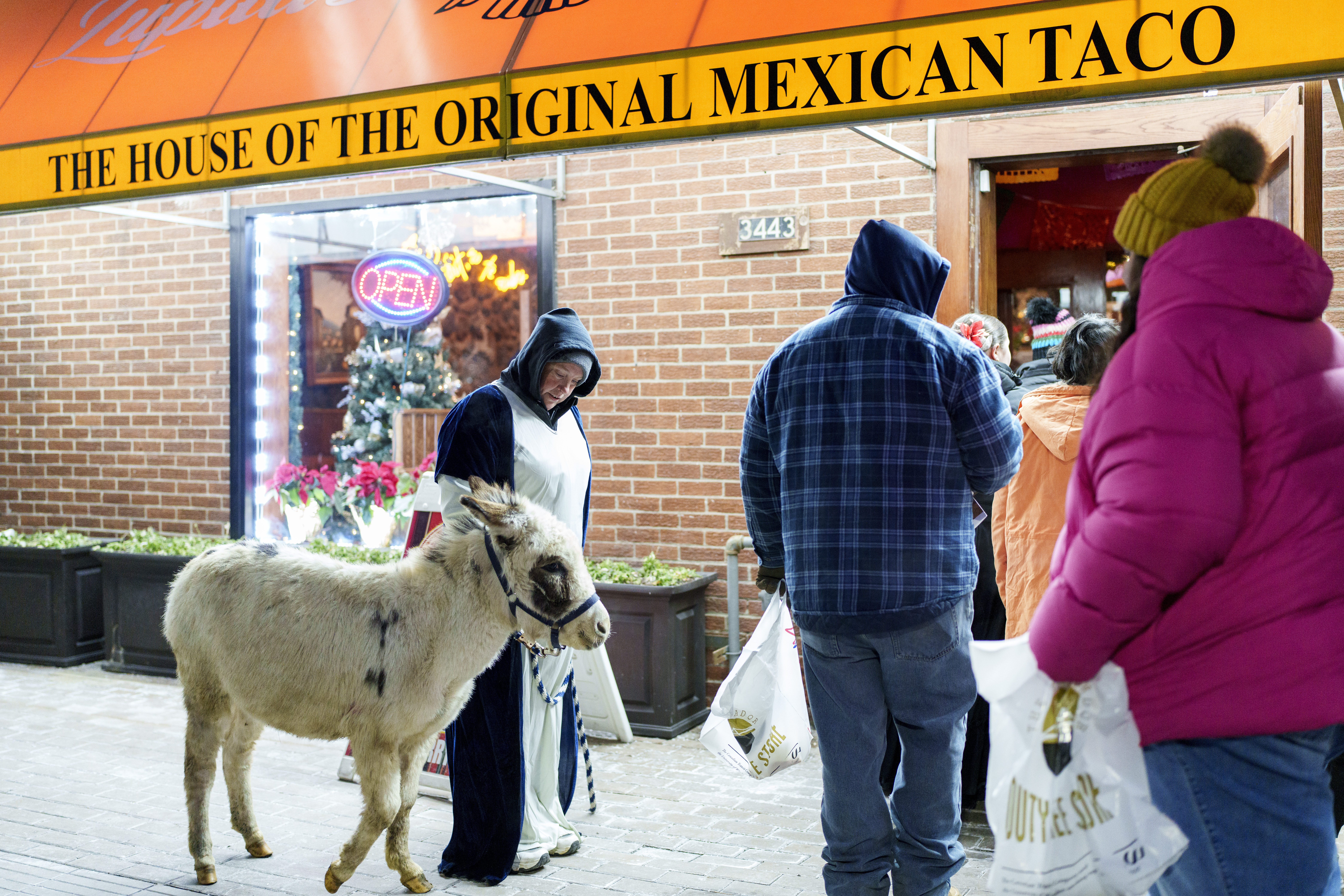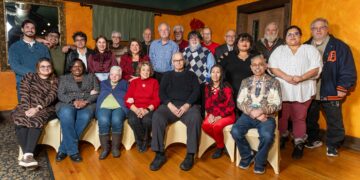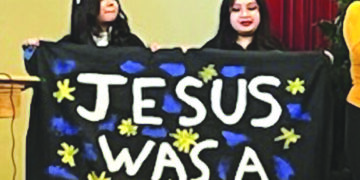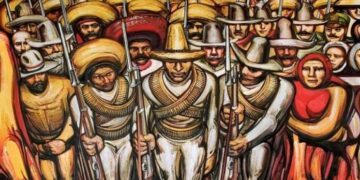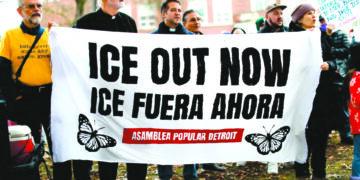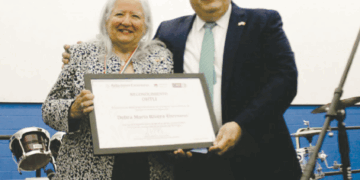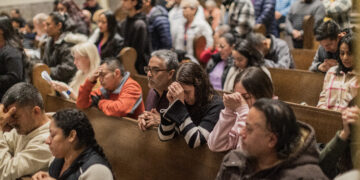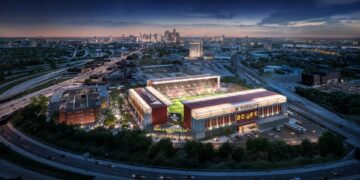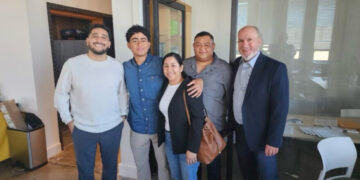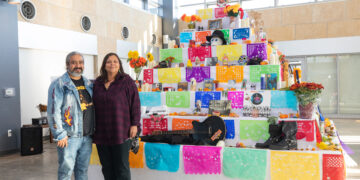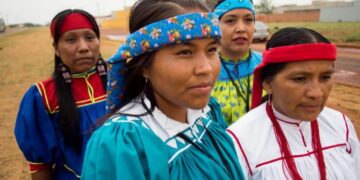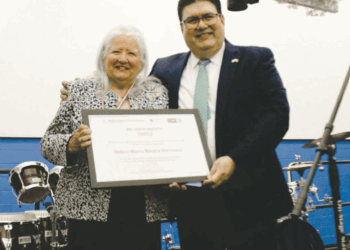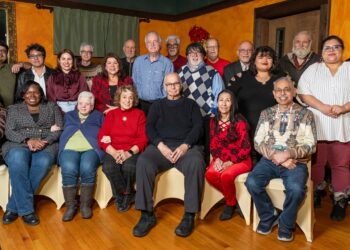At a well-attended State of Southwest Detroit Candidate Forum on Saturday, October 11, residents demanded answers from city officials and political hopefuls on issues shaping daily life in their neighborhoods, including immigration enforcement, air pollution, crumbling infrastructure, and education inequities, similar concerns that were discussed in the mayoral forum held this past July at Detroit Hispanic Development Corporation (DHDC).
Mary Sheffield and Solomon Kinloch, the two mayoral candidates on the ballot, were invited but were not present. In Sheffield’s place, due to a schedule conflict, her campaign manager, Chris Scott, sat in alongside mayoral write-in candidate Rogelio Landin, who both faced pointed questions and concerns from residents who said they are tired of being ignored.
The forum, hosted by 482Forward, Detroit Hispanic Development Corporation (DHDC), Michigan League of Conservation Voters Education Fund, Michigan United, Raices Detroit, Urban Neighborhood Initiatives (UNI) and We the People MI community organizers and advocacy groups, drew dozens of residents from District 6, many of them Latino families, who shared firsthand stories of fear, frustration, and resilience. Their testimonies painted a vivid picture of life in one of Detroit’s most vibrant yet environmentally burdened communities.
The afternoon’s most emotional testimony came from a community organizer who described witnessing an immigration raid just two minutes from her home that occurred on June 30th.
“There were Detroit police officers, ICE agents, the FBI, the DEA, 30 to 40 officers in total,” she said. “They broke down the door and detained Marcos, a man with no criminal record.” Several bystanders were pepper-sprayed, and one was arrested.
Residents called the incident “a clear and unnecessary collaboration” between Detroit police and federal immigration agents. They urged candidates for mayor, city council, and police commission in District 6 to commit to stronger sanctuary policies.
City Councilmember for District 6, Gabriela Santiago-Romero’s representative confirmed the office has been working with the Detroit Police Department (DPD) to strengthen officer training on immigration-related procedures.
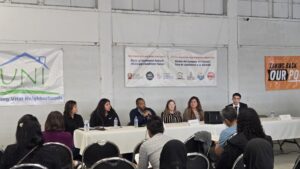
Candidate for police commission for District 6, Garret Burton, agreed that DPD must be transparent about any communication or cooperation with federal immigration agencies.
“Every ICE request to DPD should be made public,” Burton said. “Detroiters have the right to know what’s happening in their neighborhoods.”
State Representative Tyrone Carter, who is running for Detroit City Council in District 6, emphasized that City tax dollars should not be used to enforce federal crimes.
“If there are no consequences for violations, there are no rules. Officers who collaborate with ICE should face strong disciplinary measures.”
Residents also raised alarms about worsening air quality caused by truck traffic cutting through residential streets, which has been an ongoing issue in Southwest neighborhoods.
“We have five people on my block with asthma,” said one resident who resides on Evans Street.
“During the winter, trucks idle for hours, building up clouds of black smoke. In the summer, it’s dust and noise all night long.”
A newly announced enforcement effort of truck route limitations by the City of Detroit aims to limit commercial traffic to designated industrial corridors, but enforcement remains a question.
“If you can’t enforce the rule, it’s not a rule,” Carter said. “We can dedicate specific officers to ticket violators, once fines increase, companies will get the message.”
Burton echoed the call for stricter enforcement, saying DPD must collect and publish data on truck violations and environmental impact.
“Air quality is a public safety issue,” Burton said. “DPD’s job isn’t only to stop crime, it’s also to protect our right to breathe clean air.”
Infrastructure failures were another flashpoint. Residents recounted the February rupture of a 54-inch water main, which flooded more than 400 homes and displaced hundreds of families.
“People woke up to water rushing through their homes,” said Marisol Bonilla of the Detroit Hispanic Development Corporation.
Candidates called for greater investment in Detroit’s aging 100-year-old pipe system and more equitable emergency responses, following concerns after the most recent flood last winter.
“It’s cheaper to fix it before it breaks. Our neighborhoods are at higher risk because of old infrastructure and heavy industrial use. The city must prioritize these repairs in Southwest Detroit,” Carter said.
“People didn’t want to open their doors to police during the flooding and who can blame them? We need more bilingual officers from the community and stronger relationships so that residents know who’s there to help,” Carter added.
The issue of cultural preservation also surfaced as a major concern. Longtime residents say new development is pricing out families and threatening Southwest Detroit’s multicultural identity.
“Native residents aren’t getting the same opportunities as outsiders,” said Southwest Detroit resident and local organizer Mano, who urged investment in “our people, our arts, and our roots.”
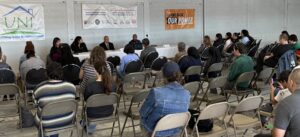
Advocates for LGBTQ rights and disability access pressed candidates on ensuring polling sites are ADA-compliant and that poll workers are trained to respect transgender and nonbinary voters.
“I’ve heard stories of voters being misgendered or turned away,” said Roland Leggett, an elections protection manager.
“City Council can fix this through funding, training, and accountability.”
Candidates largely agreed, emphasizing that “equal access is a civil right.”
The forum closed with youth voices discussing the importance of the upcoming ballot initiative “Invest in MI Kids”, including a senior from Western International High School, who spoke about leaky roofs and inadequate heating in school buildings.
“We just want a comfortable place to learn,” the senior student said.
As candidates expressed support for the Invest in MI Kids ballot initiative, which would tax Michigan’s wealthiest 5% to boost education funding.
Police commission candidate Burton also weighed in, calling for trauma-informed training and alternatives to policing in schools.
“We’ve criminalized student behavior instead of addressing trauma,” Burton said.
“Programs that connect high-risk youth to social workers and therapists reduce crime and keep kids in school.”
Throughout the afternoon, a theme of trust tied the issues together, trust between residents and police, between city officials and families, and between neighbors fighting for a healthier, safer, more equitable Southwest Detroit.
This article was made possible thanks to a generous grant to EL CENTRAL Hispanic News by Press Forward, the national movement to strengthen communities by reinvigorating local news. Learn more at www.pressforward.news.

